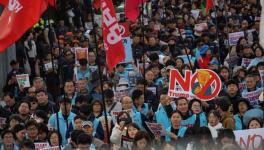Laos Economic Crisis Intensifies amid Massive Chinese Debt
Inflation in Laos has hit a 22-year high, causing a scarcity of essential commodities like fuel
Laos' economy has been on the brink of collapse due to a spiraling debt crisis that is crippling the country's finances and bringing it perilously close to default.
In June, the Southeast Asian nation's Statistics Bureau announced that inflation hit a 22-year high of 23.6%, causing staple goods to become scarce and eroding the population's purchasing power.
Meanwhile, according to the World Bank, Laos' foreign and domestic debt has ballooned to more than $14.5 billion (€14.2 billion). "It is on the brink of default," Anushka Shah, vice president and senior credit officer at Moody's Investors Service, stated unequivocally in mid-June.
Laos' foreign exchange reserves are so low that experts believe there is no way out for the small, landlocked nation without external assistance to help fulfil its debt obligations.
Laos owes about half of its foreign debt to China, which has lent the money to finance infrastructure projects such as hydropower plants and railway lines.
With Vientiane facing hard times now, focus has turned to how Beijing will handle the situation and will it be in favor of offering some form of a bailout or debt forgiveness.
COVID-19 set the country back
Laos' alarming inflation figures are the latest sign of the financial storm that continues to batter the country's debt-ridden economy.
Although the economy was humming along at 6-7% annual GDP growth for much of the decade leading up to the coronavirus outbreak, the country was hit hard by the pandemic.
"Laos' economy is small, which means it is a lot more vulnerable to shocks. The COVID-19 pandemic has really undermined any efforts towards growth," Erin Murphy, a fellow at the Center for Strategic and International Studies (CSIS), a Washington-based think tank, told DW.
The $5.9 billion China-Laos railway linking Vientiane to the Chinese border is a key spur on Beijing's Belt and Road Initiative
As a landlocked country, the small nation of 7 million people is heavily dependent on both its imports and exports with trading partners in Asia. By disrupting supply chains and causing a spike in food and fuel prices, the pandemic has put inflationary pressure on the country.
"This problem is now being made worse by various factors, including the war in Ukraine, and some Lao people are missing meals as they try to cope with a situation out of their control. While people are trying to return to normal, they face difficulties and many need help," Alex Kremer, World Bank Country Manager for Laos, recently said in a press release.
China's debt trap?
Another factor that further exacerbated the crisis is Laos' decisions to go deeply into debt to fund large-scale infrastructure projects.
"I think Laos is at the mercy of being part of China's economic plans, whether it is train connections or the hydropower that Laos can produce," Murphy said.
In recent years, Laos has placed itself at the center of growing trade, economic, and infrastructure integration in the Mekong subregion.
Its dams provide electricity to its more populous neighbors, while its growing road and rail network could connect the region's rising economies.
By undertaking projects worth more than $16 billion, according to Chinese state media Xinhua, China currently positions itself among Laos' largest foreign investors.
The latest big project, the $5.9 billion China-Laos railway linking Vientiane to the Chinese border, is a key spur on Beijing's mammoth, multibillion-dollar infrastructure-building Belt and Road Initiative.
Critics of Beijing's global expansion and infrastructure-led foreign policy, however, warn that poorer nations like Laos could risk falling into China's "debt traps," which they say allow Chinese investors to take possession of key national assets when debtor nations cannot repay the loans.
According to AidData Lab, a research lab at William & Mary's Global Research Institute, the total value of Laos' public debt to China is about $12.2 billion, substantially higher than the World Bank calculation.
So far, Beijing has been mostly silent over Laos' debt woes. The Chinese embassy in Vientiane didn't respond to DW's requests for comment.
Too much at stake for China
"No doubt Laos faces economic and financial difficulties that are tremendous and worryingly severe, but I don't think China will let Laos default," said Toshiro Noshizawa, professor at the University of Tokyo's Graduate School of Public Policy.
While the size of debt obligations alone appears to suggest that default is inevitable, geo-economic factors would make such simple predictions unrealistic, he added.
Since 2013, China has invested more than $800 billion into its Belt and Road Initiative, with Laos as a key ally to build stronger economic ties across Southeast Asia.
Against this backdrop, a Lao debt default could damage China's reputation as a partner in the developing world, specifically in this region.
"China has too much at stake, both diplomatically and economically. I think that it will be willing to step in because in the grand scheme of things, Laos has a lot of debt, but it's not as enormous as other countries," Murphy underlined.
Laos' balancing act between the powers
With Beijing's grip tightening and the inflation worsening, Laos finds itself in a difficult balancing act between the powers.
China is by no means Laos' only significant or economic partner. The country has an impressive track record of balancing the interests of competing diplomatic partners.
Japan has long been Laos' largest bilateral aid donor, while Vietnam, for instance, is still considered the country's most important security partner.
Despite its economic woes, Vientiane has so far avoided talking to its international lenders about renegotiating its debt. During the COVID pandemic, the country chose to borrow new money from Beijing rather than seek loans from multilateral lenders.
Ideally, Laos "can get the best of all worlds while addressing their debt issue," Murphy said. In the worst case, if other diplomatic partners feel their position in Laos is being undermined by China's influence, Laos' economic crisis could become a geopolitical issue.
Edited by: Srinivas Mazumdaru
Get the latest reports & analysis with people's perspective on Protests, movements & deep analytical videos, discussions of the current affairs in your Telegram app. Subscribe to NewsClick's Telegram channel & get Real-Time updates on stories, as they get published on our website.

























